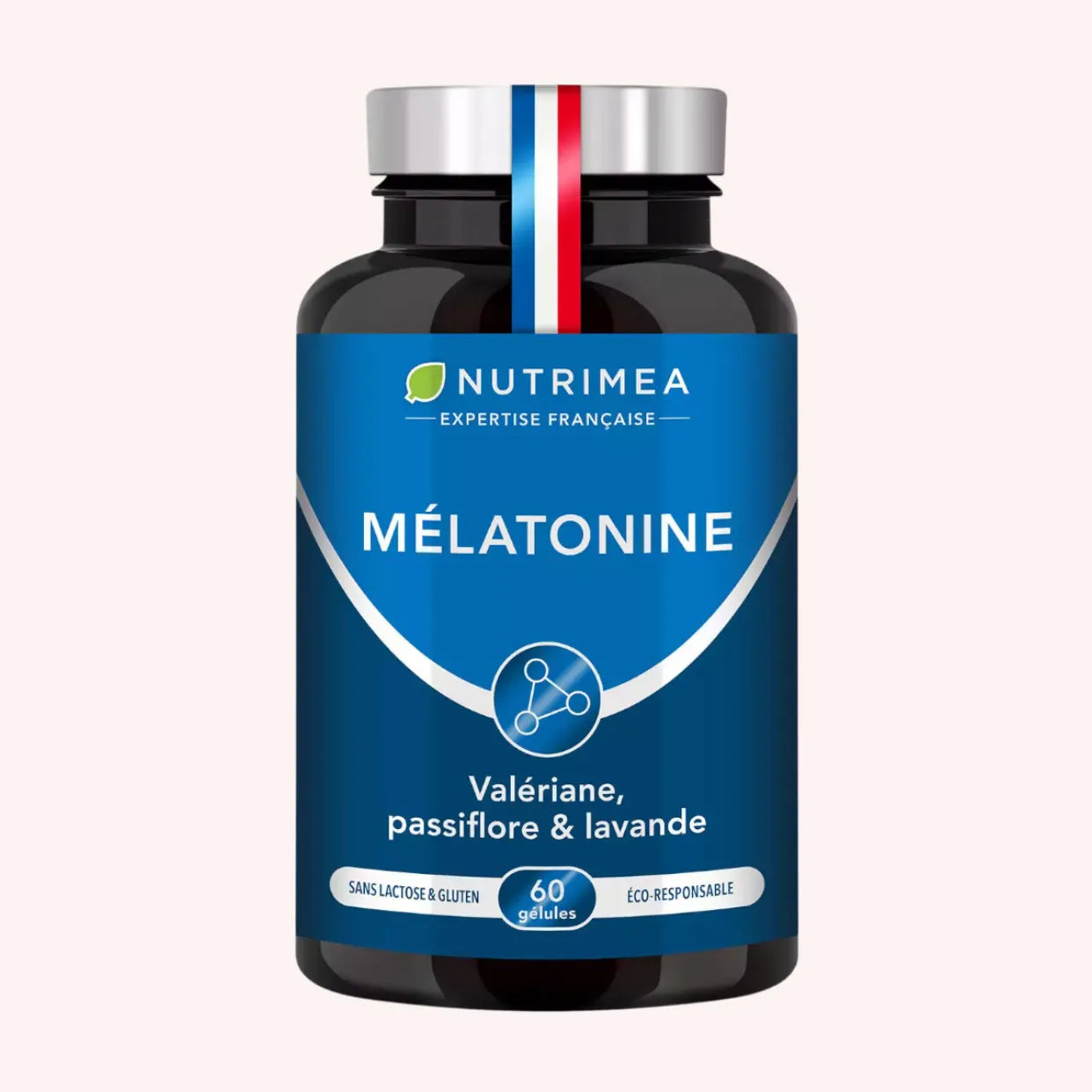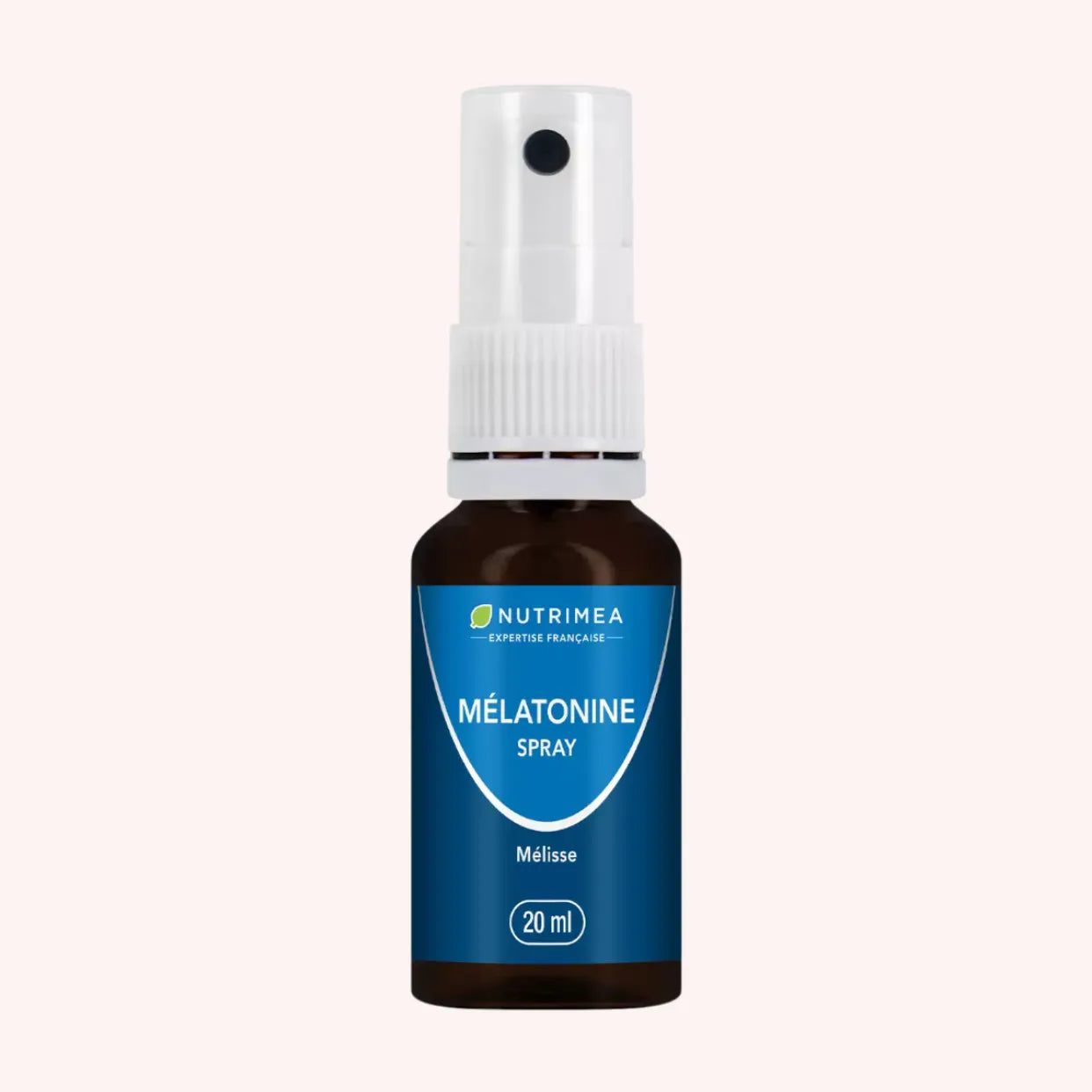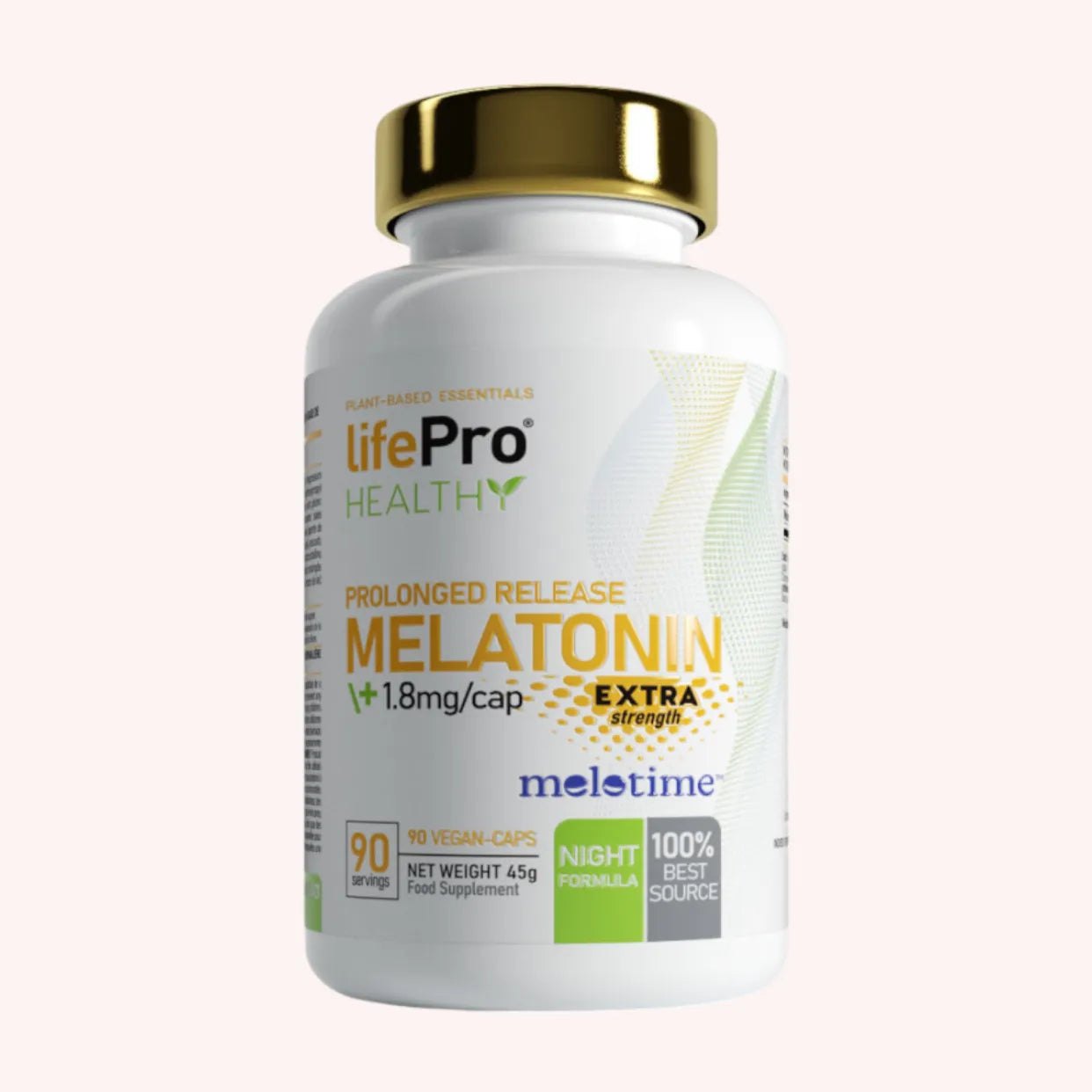Sleep is essential to our health, and melatonin , the hormone naturally produced by our bodies, is one of the key regulators. Often called the “sleep hormone,” melatonin is responsible for helping us fall asleep and regulating our circadian rhythm .
In this article, we will explore in detail the benefits of melatonin , its role in sleep management, falling asleep and jet lag .
What is melatonin and how does it work?
Melatonin is a hormone naturally produced by the pineal gland , a structure located in the center of the brain. This hormone plays a key role in regulating our circadian cycle (our internal biological clock), which synchronizes our periods of wakefulness and sleep with the natural rhythms of day and night.
Melatonin production
Melatonin production is closely linked to light exposure. During the day, light inhibits its production, allowing our bodies to stay alert and awake. However, as night falls and there is no light, the pineal gland begins to secrete melatonin, signaling to our bodies that it is time to relax and prepare for sleep.
It's important to note that blue light , emitted by phone, tablet, and computer screens, disrupts this production by simulating daylight, which can delay falling asleep. This explains why using electronic devices before bed can harm the quality of our sleep.
Once released into the blood , melatonin works by reducing alertness, lowering body temperature and promoting the onset of drowsiness. It thus helps prepare the body for sleep, acting as a natural mechanism that ensures that our body rests at the most appropriate time in the day and night cycle.
The Circadian Cycle: Understanding the Biological Clock
The circadian rhythm is a natural biological process that regulates our waking and sleeping hours, as well as many other bodily functions. This 24-hour cycle, often referred to as our biological clock , influences not only our sleep, but also our body temperature, hormone production, appetite, and even our energy levels.
How does the circadian cycle work?
The circadian cycle is governed by specific brain structures, primarily in the hypothalamus . This control center receives real-time information about the light entering our eyes and adjusts our biological rhythms accordingly. When light is present, the body remains awake and alert. But when darkness sets in, melatonin production increases, signaling that it is time to prepare for sleep.
Factors influencing the circadian cycle
The circadian cycle can be disrupted by various factors, including:
- Light exposure: Light plays a crucial role in synchronizing our internal clock. Bright light, especially the blue light from electronic screens, can delay melatonin production and disrupt the circadian cycle, making it harder to fall asleep at night.
- Time zone changes: Jet lag occurs when the circadian rhythm no longer matches local time, often occurring after a long flight across multiple time zones. This can lead to disruptions in sleep, alertness, and eating habits.
- Night work and irregular hours: Night workers or those with irregular work schedules often experience desynchronization of their circadian cycle, which can cause sleep and long-term health problems.
- Seasonal changes: During winter, the decrease in natural light can disrupt some people's circadian cycle, leading to fatigue and difficulty sleeping.
The role of melatonin in the circadian cycle
Melatonin plays a vital role in regulating the circadian rhythm. Released by the pineal gland, it helps signal to our bodies that it's time to rest and prepare for sleep. It helps adjust our sleep rhythms based on light and dark signals.
However, disruptions such as exposure to artificial light at night can disrupt melatonin production and, consequently, alter the circadian cycle. This can make it harder to fall asleep, shorten sleep duration, and affect the quality of rest.
Circadian cycle desynchronization and its consequences
When the circadian cycle is disrupted, it can lead to a range of sleep disturbances and health problems, including:
- Insomnia: Sleep disturbances are common among those who have irregular schedules or experience frequent time zone changes. This can make it difficult to fall asleep or cause nighttime awakenings.
- Fatigue and decreased alertness: Poor synchronization between the circadian cycle and the environment can lead to fatigue, difficulty concentrating and decreased performance.
How to realign the circadian cycle?
There are several ways to help restore circadian balance:
- Avoid blue light at night: Reducing exposure to computer, phone, and tablet screens before bed is essential to promote melatonin production and help restore a natural sleep rhythm.
- Practice natural light exposure: It is important to expose yourself to natural light, it helps to synchronize the biological clock with the day and night cycle.
- Follow a regular sleep routine: Going to bed and waking up at regular times every day, even on weekends, can strengthen the circadian cycle and improve sleep quality.
The benefits of melatonin for sleep
Melatonin is widely recognized for its effectiveness in improving sleep quality and managing certain sleep disorders. It has several well-documented benefits, both for people who have trouble falling asleep and for those simply looking to optimize their quality of rest. Here are the main benefits of this hormone:
Improved sleep quality
Melatonin supplements are commonly used to promote better sleep. They may be particularly helpful in reducing the time it takes to fall asleep and increasing total sleep time. A study by Gholami et al. showed that melatonin supplementation improves sleep quality (1).
Circadian cycle regulation and jet lag
The circadian cycle regulates our periods of wakefulness and sleep based on external cues like light. Melatonin plays a crucial role in adjusting this cycle, especially for people with irregular or disrupted schedules. It not only helps improve sleep quality, but also regulates cycles disrupted by factors like jet lag or unconventional work schedules .
By making it easier to adapt to new schedules, melatonin reduces fatigue linked to jet lag and allows for better sleep regularity, even in the event of frequent schedule changes.
The role of good sleep: Mental and athletic recovery
Sleep is more than just a moment of rest. It plays a fundamental role in our physical and mental recovery and is an essential pillar of our overall well-being. Good sleep not only promotes the body's recovery, but also optimizes cognitive, emotional, and physical performance. Whether you're a top athlete, a sports enthusiast, or simply an active person, the benefits of restorative sleep are crucial.
Mental Recovery: Sleep, a Boost for the Brain
Deep sleep is essential for mental recovery . During the night, the brain goes through different stages of sleep, including rapid eye movement (REM) sleep and deep slow-wave sleep, two stages that are particularly important for cognitive recovery.
- Memory consolidation: During sleep, the brain sorts and stores information from the day. This helps reinforce learning and better retain essential information. It is during this phase that the brain sorts memories and transforms them into long-term memories.
- Emotional regulation: Good sleep helps regulate emotions and reduces stress . It allows the brain to process and manage the day's emotions, contributing to better mental health. A good night's sleep can decrease levels of the stress hormone cortisol and increase the production of serotonin , a neurotransmitter associated with well-being.
- Improved cognitive abilities: Good quality sleep improves concentration, decision-making, and problem-solving. A well-rested brain is better able to handle complex tasks and react quickly to situations.
Sports recovery: Sleep, a key performance factor
Sleep is also crucial for physical recovery , especially for those who regularly engage in intensive physical activity or sports. After a workout, the body needs time to repair and strengthen itself, and this is mainly done during sleep.
- Muscle Repair: During sleep, the body releases growth hormones that promote the repair and rebuilding of muscle fibers damaged during exercise. It is also during this time that energy stores, such as muscle glycogen , are replenished, allowing the body to recover and prepare for the next effort.
- Reduced fatigue: After an intense workout, muscles and body tissues are under stress. Sleep helps reduce this muscle fatigue by allowing the body to recover, which promotes better performance in future sessions.
- Performance Optimization: Studies have shown that restorative sleep can improve strength, endurance, and responsiveness. Insufficient sleep can impair coordination, slow reflexes, and decrease training effectiveness. A well-rested athlete will have better resistance to exertion and can improve their long-term performance.
Melatonin Supplement: How to Use It Safely
If you are considering taking melatonin as a supplement, it is important to follow certain guidelines to ensure effective use.
Melatonin dosage
Melatonin dosage varies from person to person. Generally, a dose of 0.3 mg to 2 mg is recommended. It is best to start with a low dose and adjust over time.
It is recommended to take this food supplement 30 minutes to 1 hour before going to sleep to maximize its benefits.
Side effects
Although generally considered safe, melatonin may cause side effects in some people, including headaches or bloating.
It is recommended that you consult a healthcare professional before starting melatonin supplementation, especially if you have any pre-existing medical conditions.
Conclusion: Melatonin, a natural support for your sleep
In conclusion, melatonin is much more than just a sleep-regulating hormone: It is a key regulator of our circadian cycle . In addition to promoting restful sleep , melatonin helps to better manage jet lag and restore a disturbed biological balance.
Quality sleep is crucial for maintaining optimal health , both physical and mental. Thanks to its natural properties, melatonin can be a valuable ally in improving the quality of your sleep, especially if you are experiencing disruptions in your biological rhythm. However, before considering taking melatonin supplements, it is important to consult a healthcare professional to determine the right dose for your specific needs.
Sources:
- Gholami, F., Moradi, S., Rasaei, N., Soveid, N., Setayesh, L., & Mirzaei, K. (2022). Effect of melatonin supplementation on sleep quality: a systematic review and meta-analysis of randomized controlled trials . DOI: https://link.springer.com/article/10.1007/s00415-020-10381-w
- Cipolla-Neto, J., & Gaspar do Amaral, F. (2018). Melatonin as a Hormone: New Physiological and Clinical Insights . Endocrine Reviews. DOI: https://academic.oup.com/edrv/article/39/6/990/5094958?login=false
- Arendt, J., Aulinas, A., et al. (2019). Physiology of the Pineal Gland and Melatonin . DOI: https://pubmed.ncbi.nlm.nih.gov/31841296/











